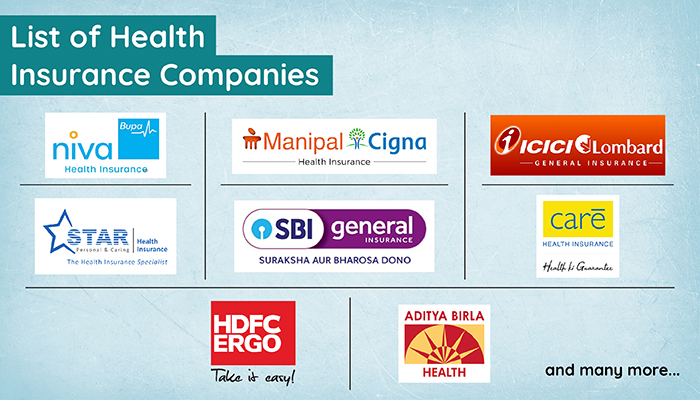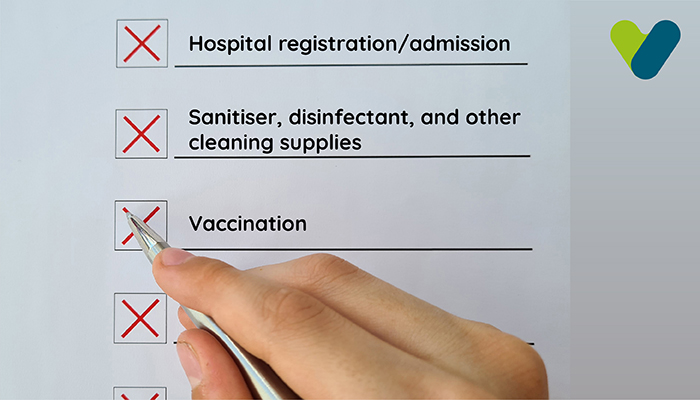Changing lifestyles, increasing age, rising medical inflation, and intensifying health concerns are some of the factors that may compel you to look for the best health insurance plan. Although some people already have health insurance plans, they may not have enough coverage to withstand the present healthcare expenses. There are numerous health insurance providers today that offer different types of health insurance with all sorts of benefits included in a package. It is only a matter of investing time in research to find the perfect match for your needs. Some of the best health insurance are enlisted here.
People often think about investing in health insurance and securing their family’s future but don’t know where to start. This page can serve as a guide for you to find the best health insurance policy for you and your family.
What is health insurance?
Health insurance is a financial contract between two parties—insurance providers (insurer) and consumer (insured). This is a legal document that signifies the insurer’s agreement to pay for predetermined medical expenses of the insured in exchange for small fees (policy premium) every month. Depending on the insurance policy, you may be required to pay additional deductibles or charges. Generally, the contract is a one-year agreement, which can be renewed again with mutual consent.Best health insurance plans aim to provide comprehensive coverage for your medical expenses in a medical crisis or for routine check-ups. Many people also use health insurance as a financial tool to maximise their savings and avail tax benefits.
Types of health insurance plans
Following are some of the most common types of medical insurance policies based on the consumers’ needs:- Individual insurance plan
- Family/float insurance plan
- Mediclaim insurance plan
- Disease-specific insurance plan
- Personal accidental insurance plan
How to pick the best health insurance policy for you?
Here’s a simple guide to help you buy the best medical insurance according to your needs:- For young or single people
- For people who have a spouse and/or a family
- For your parents or senior citizens
- For additional coverage boost only
Please note that before finalising any plan, you should invest some time in research and consider all encompassing factors—required sum insured, your age, number of family members, and their ages—to select the best health insurance plan for you.
Importance of health insurance
Looking for the best health insurance plan has become a necessity these days. Following are some of the reasons you should invest in a medical insurance:- Financial security
- Peace of mind
- Optimum care
- Beat medical inflation
- Tax benefits
- Additional benefits
Some of the best health insurance plans
Finding the right plan for you can feel like a daunting task when you have to go through the plethora of insurance policies online. Following are some of the best health insurance plans available today with key features, categorised by different policy types.Individual/Family floater insurance plans
This is the most common type of health insurance people seek either for themselves of their entire family.
- HDFC Ergo Optima Restore
- Sum insured ranges from INR 3 lakhs to INR 1 crore
- Three policy tenure options of 1, 2, or 3 years
- More than 13,000 network hospitals PAN India
- Optional benefit for 100% unlimited restorations of the basic sum insured in a policy year after exhaustion
- 50% increase in your coverage for every claim free year (subject to a maximum 100% increment)
- Preventive health check-ups at the time of policy renewal after continuous coverage
- Up to 8% discounts on renewal if you actively live a healthy lifestyle
- No capping on room rent or type
- All day care procedures are covered
- Care Advantage
- Three options for sum insured of INR 25 lakhs, INR 50 lakhs, and INR 1 crore
- Lifelong renewability
- Availability of over 9,800 network hospitals
- Automatic recharge of the basic sum insured once in a policy year upon exhaustion
- 10% increase in the sum insured for every claim-free year up to a maximum of 50%
- Minimum age of 5 years for getting insured (proposer must be 18+) and no maximum age
- No sub-limit on room rent or ICU charges
- Air ambulance cover of up to INR 5 lakhs
- Free annual health check-up
- Optional covers for reducing the waiting period and waiving co-payment clauses at additional costs
- Star Mediclassic Base/Gold
- Sum insured ranges from INR 1.5 to 25 lakhs
- Policy term can last up to 3 years
- Cashless facility available at 13,000+ network hospitals
- All day care procedures are covered
- Minimum entry age is 5 months and maximum entry age is 65 years for getting insured
- Coverage for AYUSH (Ayurveda, Yoga & Naturopathy, Unani, Siddha and Homeopathy) treatment
- Coverage for cataract treatment with specified sub-limits
- Limited coverage for treatment of an infant 16 days after the baby’s birth
- Optional covers at additional charges for hospital cash, rehabilitation, weight management, change of gender treatment, cosmetic procedures, etc.
These plans are more of a necessity for people with chronic diseases who wish to invest in their secure future.
- Care Freedom
- Treatment expenses for diabetes, high blood pressure, and high BMI are covered
- Annual sum insured ranges from INR 3 to 10 lakhs
- Availability of 9,800+ network hospitals across India
- Policy tenure of 1, 2, or 3 years
- Coverage for medical expenses, including treatment for cataract, total knee replacement, hernia, hysterectomy, renal complications, cardiovascular and cerebrovascular disorders, and cancer, with specified limitations
- Lifelong renewability
- Annual health check-ups for each adult
- Available for individuals and families (up to 6 members)
- Allowance for consumables or non-medical essential items required for treatment during hospitalisation
- Complete recharge of sum insured upon exhaustion
- Optional coverage for home care and extensive health check-ups for diabetes and cardiac ailments
- Activ Health Platinum Enhance by Aditya Birla Health Insurance
- Chronic management program that covers treatments for diseases such as asthma, high blood pressure, diabetes, and high cholesterol when these are detected after policy purchase
- Sum insured ranges from INR 2 lakhs to INR 2 crores
- Access to health coach for expert guidance on nutrition, fitness, mental health, etc.
- 50% increment in base sum insured for every claim-free year (up to a maximum of 100%)
- Coverage for advanced treatments including oral chemotherapy and robotic surgery
- Complete recharge of the sum insured in a policy year for unrelated disease
- Obesity and AYUSH treatment expenses are covered
- Rewards for leading a healthy life equivalent to (up to 100%) the sum insured
- Expenses for obesity, AYUSH, day care, and domiciliary treatment covered up to the sum insured
- No maximum entry age and lifelong renewability
These plans are designed keeping in the mind the medical requirements of a woman.
- TAGIC MediCare Primier
- Coverage for the maternity expenses of up to INR 50,000 (and additional INR 10,000 for a girl child), subject to a waiting period of 4 years of continuous coverage
- Treatment cover of up to INR 10,000 for a new-born for essential medical treatments at the same hospital where the infant was born
- Coverage for first year vaccination expenses for the baby of up to INR 10,000 and an additional INR 5,000 for a girl child
- Sum insured ranges from INR 5 to 50 lakhs
- Policy tenure of 1, 2, or 3 years
- Minimum entry age of 5 years and maximum entry age of 65 years
- Family floater coverage offered for up to 7 members
- Global coverage for the medical expenses incurred outside India if the diagnosis was made in the country
- ManipalCigna ProHealth Preferred/Premier
- Coverage up to a specified limit for maternity expenses for 2 child births for the mother aged between 18 and 45
- Coverage for medical expenses for the treatment of a new-born and first year vaccinations
- Options for the sum insured (Preferred plan)—INR 15/30/50 lakhs
- Sum insured for the premier plan is INR 1 crore
- 100% restoration for the basic sum insured in a policy year
- Optional cover for reducing maternity waiting period
- Coverage for organ donation, AYUSH, and domiciliary treatment expenses
- Annual free medical health check-ups with a specified list of included tests
Medical expenses gradually increase with the increasing age; here is a plan made especially for the elderly.
- HDFC Ergo my:health Suraksha Silver Smart Plan
- Home healthcare and nursing coverage
- Sum insured ranges from INR 3 lakhs to INR 50 lakhs
- Policy tenures of 1, 2, or 3 years
- Lifelong renewability and no maximum age restrictions on entry
- No capping on the room rent
- AYUSH coverage
- Health coach access for weight and disease management, nutrition, and fitness guidance
Some insurance policies have the option for choosing additional coverage for critical ailments when they occur with a waiting period for raising claims.
- ICICI Health Shield
- Optional critical illness cover at additional charges
- Coverage for critical illnesses or medical procedures, including cancer, open chest coronary artery bypass grafting, kidney failure treatment, major organ/bone marrow transplant, stroke, permanent paralysis, open heart replacement, with limitation
- Sum insured ranges from INR 3 lakhs to INR 50 lakhs
- Policy tenure options of 1, 2, or 3 years
‘Frequent flyers’ is a term used for individuals who are hospitalised four or more times in a single year. This plan is appropriate for people who require a high coverage amount.
- ManipalCigna ProHealth plan
Things to know before purchasing health insurance online
If you invest some time in research, you can make an informed decision about the medical insurance policy maybe save some money. Here’s a list of things you should know about before investing in a plan:- Claim settlement ratio (CSR)
- Sum insured
- Online policy premium calculator
- Indemnity based vs fixed benefit medical insurance plan
If you are not sure about the scope of medical expenses in the near future, you can go for an indemnity-based coverage while choosing the insurance plan. However, if you feel that your medical expenses will likely not be more than the sum insured then you can avoid paying the extra deductible cost.
- Optional covers or riders
- Maternity rider
- Hospital cash rider
- Critical illness benefit rider
- Waiting period waiver
- Accidental death benefit rider
- Sub-limit clauses
- Waiting period for pre-existing
For the purpose of building good faith with the insurance provider, which also impacts your claims later on, it is always better to disclose a pre-existing condition. In case you withhold this information at the time of purchase, insurance provider can partially/completely reject your claim request.
- Renewability
- Eligibility criteria
- Common inclusions and exclusions
Here’s a list of common expenses covered in a health insurance:
- Pre- and post-hospitalisation treatment
- IPD treatment
- Diagnostic and investigative tests including X-rays
- Room rent
- Doctor consultation
- Medical equipment used in surgery
- No-claim bonus
- Rewards for maintaining good health (such as free annual health check-ups)
- Treatment for mental health problems
- Organ donor expenses
- Treatment for injuries due to self-harm or unlawful activities
- Treatment for congenital (from birth) diseases
- Cosmetic and dental procedures
- Treatment for weight management such as nutritionist’s fee
- HIV treatment
- Treatment for injuries due to natural forces or war
Claim settlement process
Although the claim settlement process is similar for most insurance companies, make sure to read the policy documents to avoid making mistakes in your claim request.- Cashless claim
The procedure for raising cashless claim is easier than that for raising a conventional reimbursement claim. After intimation, you only have to fill a form at the reception or third-party administrator’s (TPA’s) desk and share few basic details; the rest will be taken care by the insurance provider and the hospital. The TPA will also ask you for your customer ID or policy number for verification. Some of the best health insurance companies, such as Star Health Insurance, pride themselves on processing claim requests at the network hospitals within 2 hours.
- Reimbursement claim
Following documents are required for the reimbursement claim:
- Duly filled claim form
- Investigative and diagnostic reports
- Consultation forms
- Pharmacy bills
- Discharge summary and/or fitness certificate
- Receipts of any equipment used in the treatment
- Final hospital bills
- Cancelled cheque or NEFT details
- FIR or mediocre-legal certificate (MLC) in case of an accidental injury treatment
Final word—which health insurance should you buy?
After investing some time, you will likely know the requirements and a rough idea about the ideal premium amount. This information will form the basis for your decision. You should go through a few brochures of the best health insurance policies according to you and figure out which one suits you the most. Make sure to consider all the factors mentioned in the ‘Things to know’ section so that you can make an informed decision.If you haven’t found the appropriate policy, wait for a while or talk to the insurance provider to see if they can accommodate your requirements at a reasonable price. Since, buying health insurance is a long-term commitment, it is better to wait for some time instead of getting caught up in the wrong insurance plan. In case you have some qualms about the policy, most insurance providers share contact information on their website. Book an appointment to clear doubts or visit the nearest branch office to enquire about the policy.




